As you head into the holiday season, there’s a lot going on. You’re planning that big family feast, decking the halls with boughs of holly and finalizing your gift list. The last thing on your mind is what’s going on in your stomach. Unfortunately, that can change in an instant.
Stomach pain after holiday indulgences is not uncommon. What
is uncommon?
Drinking tea for digestion. It may be popular in some cultures, but not nearly enough people take advantage this warm brew. Unlike coffee or hot cocoa, herbal tea offers beneficial compounds that are known to support the digestive process.
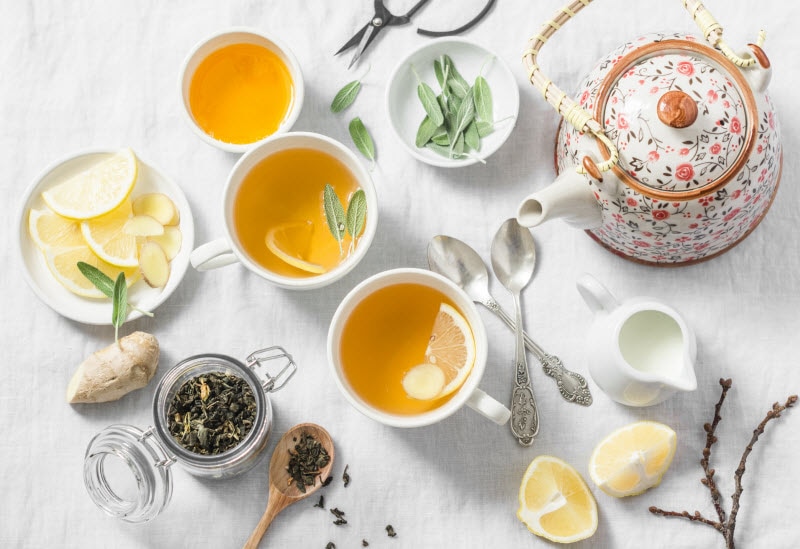
Whether you’re prone to overeating or simply want to savor some new foods, drinking certain
types of tea might help you find comfort this holiday season. Of course, some herbal blends are better than others. So we’ve compiled the top five herbs you want filling up your cup.
How Tea Supports Digestion
It’s warm — Your internal body temperature is 98.6 degrees Fahrenheit. When you eat cold food, your body has to warm it up to that temperature in order to properly digest. By consuming hot or even lukewarm tea, your digestive system can go right to work. It doesn’t waste time or energy heating up what you just put down. This results in much more efficient digestion.
It’s steeped in herbs — Herbs are plants with powerful aromatic properties. These aromatics, along with polyphenols and other important compounds support health. Each herb differs in its exact makeup and health benefits. But many have been shown to aid the digestive system at various points in the process.
5 Herbs to Consider for the Holiday Season
If you have plans to eat this holiday (who doesn’t?), consider brewing up one of the top five herbs below. They can be enjoyed before, during or after you dig in. And they aren’t hard to find. Each of these is commonly used in herbal teas. So drink up and have a merry-good month!
1. Chamomile
Chamomile (
Matricaria recutita) is known for its soothing properties. Most people enjoy it in the evening to help them feel calm and relaxed before going to bed. Of course, there’s a reason this herb is so soothing. Chamomile contains
antispasmodic compounds that help relax smooth muscles, like the ones found in your gastrointestinal tract. Smooth muscles of the digestive tract create waves of contraction and relaxation to help push food along. This process is called peristalsis and it’s one of the early stages of digestion.
Pour a cup:
Chamomile has a naturally sweet flavor with notes of apple. That’s why
pure chamomile tea is such a crowd pleaser – no added herbs or sweeteners necessary.
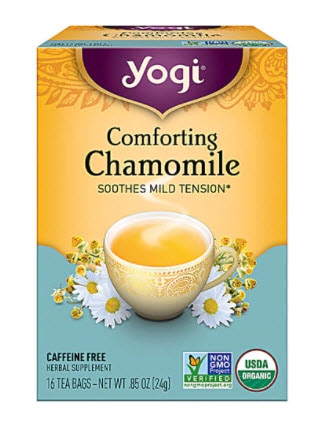 2. Dandelion
2. Dandelion
The dandelion flower (
Taraxacum officinale) has a bad reputation. Most people see it as a pesky weed that takes over the yard. The truth is dandelions offer so much more than meets the eye. Like all bitter greens, dandelion greens trigger
the digestive process. The bitterness awakens taste buds, which initiates the production of digestive juices like saliva. The root of dandelions are also an important part. The root is chock-full of fiber. Fiber is essential to a healthy gut – and not just because it promotes regular bowel movements. Some fiber is utilized by gut microbes, thus helping maintain those beneficial bacteria.
Pour a cup:
The entire dandelion plant is edible. In fact, dandelion tea can be made from the leaves, flower or root. The flower offers a nice sweet flavor. But the root’s natural bitterness is what makes it the preferred choice for making tea. Look for
roasted dandelion root in your tea bag. The roasted notes are reminiscent of black coffee, making it a great caffeine-free alternative to your morning joe.
 3. Ginger
3. Ginger
Ginger (Zingiber officinale) is a perennial flowering plant with a well-known and highly regarded rhizome, or root. Ginger root has been used for more than 2,500 years as a wellness essential. Most people add ginger to their cooking, because it offers a spicy zing. The active compounds responsible for that spiciness are called gingerols. Gingerols, along with another active constituent shogaols, are partly responsible for
ginger’s anti-emetic properties. This is why ginger is commonly used to relieve nausea and vomiting.
Ginger is also effective in
improving gastroduodenal motility. The duodenum is the first part of the small intestine. It’s where partially digested foods mix with bile from the gallbladder and digestive juices from the pancreas. Here, nutrient absorption begins. By promoting movement through the duodenum, you promote clear and easy digestion.
Pour a cup:
As you know, the ginger root can be enjoyed all on its own. That pungent aroma is a delightful kick to the taste buds. But in tea form, ginger root is often mixed with sweet or citrusy flavors to make a more palatable sip.
Lemon ginger tea is always a homerun!
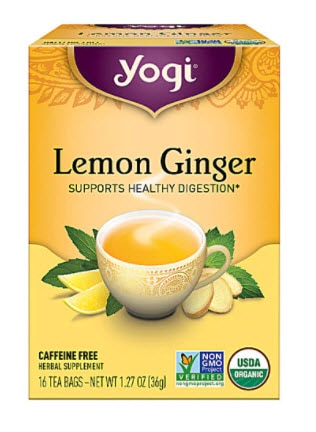 4. Licorice
4. Licorice
Yes, licorice is an herb. Its botanical name is
Glycyrrhiza glabra and it is deeply rooted in ancient herbal medicine
. Because of its long-standing history, licorice has been widely studied for its potential health properties. What researchers discovered is licorice’s most valuable compound is called
glycyrrhizin. This compound has anti-inflammatory effects that may relieve stomach discomfort.† Flavonoids found in licorice root are also important compounds. The flavonoids known as glabridin and glabrene are significantly beneficial for gastrointestinal health, specifically regarding
Helicobacter pylori (H. pylori) growth.
Pour a cup:
Glycyrrhizin of the licorice root is 50 times sweeter than sucrose. No wonder it’s called “sweet herb” in Chinese. That said, licorice root is often combined with other stomach-soothing herbs and warming spices.
Yogi Egyptian Licorice Mint tea features cardamom, clove, ginger and peppermint to create a spicy-sweet drink.
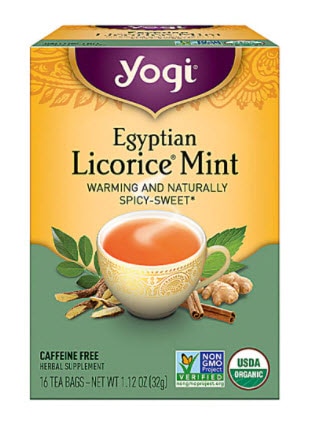 5. Peppermint
5. Peppermint
Did your mom ever tell you to suck on a peppermint candy to ease motion sickness? She wasn’t making this up.
Animal studies determined that peppermint has a relaxing effect on gastrointestinal tissue. The main benefits come from the plant’s leaves, where important phenolic constituents reside. These constituents include rosmarinic acid and several flavonoids. But, for some people, simply smelling this herb is powerful enough. As a member of the mint family, the peppermint plant (
Mentha x piperita) has a strong semi-sweet aroma and delightfully cooling aftertaste.
Pour a cup:
Obviously, peppermint has a naturally vibrant flavor profile. As a result, it’s often used in herbal tea blends to liven up the brew. But if you want to fully enjoy the soothing benefits of peppermint, sip on
Yogi Purely Peppermint after you eat. Don’t add sugar or honey. Let the peppermint leaves stand on their own.
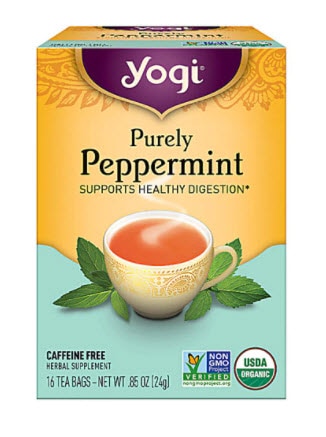
 Whether you’re prone to overeating or simply want to savor some new foods, drinking certain types of tea might help you find comfort this holiday season. Of course, some herbal blends are better than others. So we’ve compiled the top five herbs you want filling up your cup.
Whether you’re prone to overeating or simply want to savor some new foods, drinking certain types of tea might help you find comfort this holiday season. Of course, some herbal blends are better than others. So we’ve compiled the top five herbs you want filling up your cup.
 2. Dandelion
2. Dandelion 3. Ginger
3. Ginger 4. Licorice
4. Licorice  5. Peppermint
5. Peppermint



